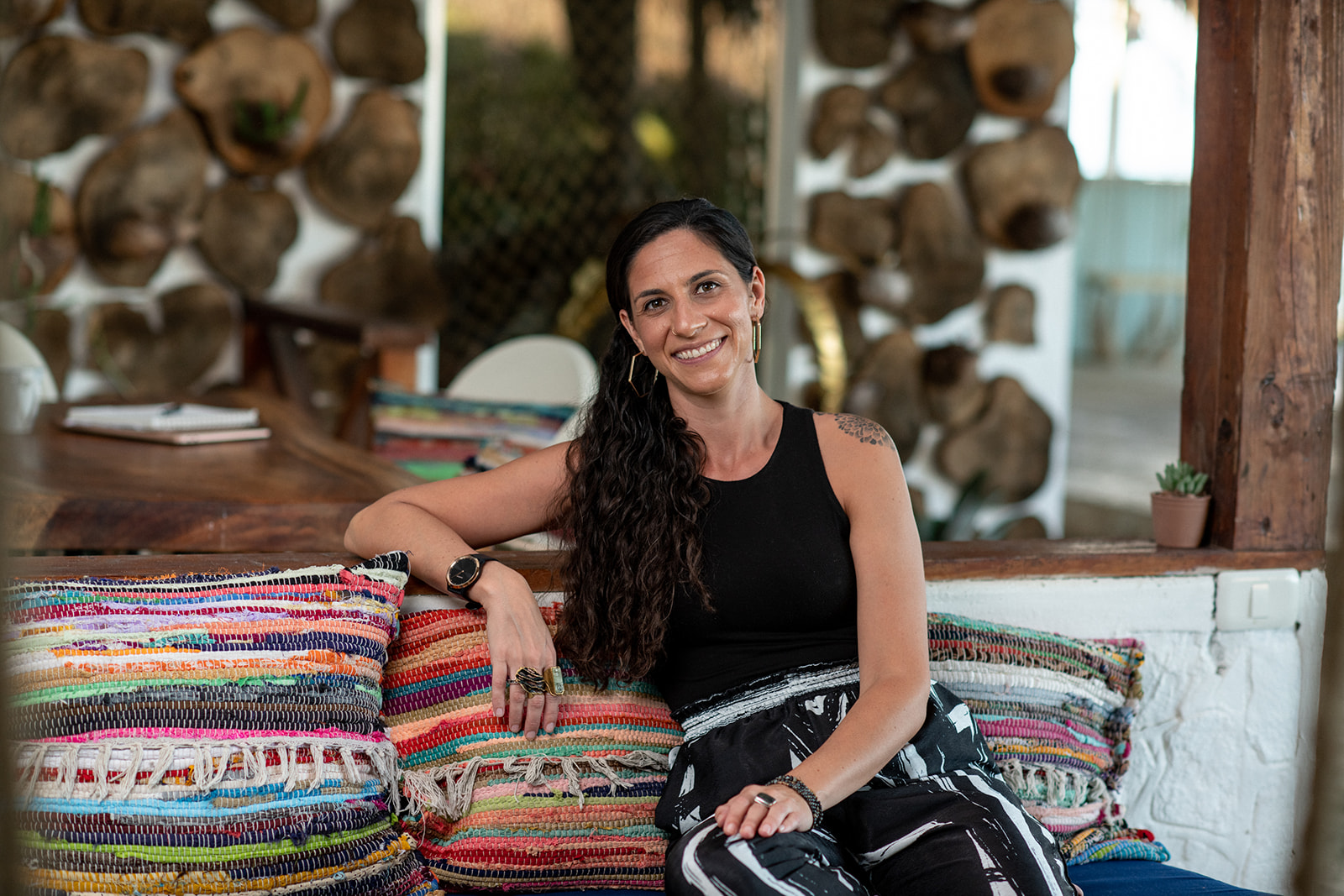An 8-session one-on-one offering to help you parent your neurodivergent
kids from a truly empowered & regulated place
An 8-session one-on-one offering to help you parent your neurodivergent
kids from a truly empowered & regulated place
Regulated & Resourced

Breakdown the biggest misconceptions about neurodivergent behaviors, get radically curious about your own parenting patterns & triggers, and learn necessary skills to help you regulate so you can apply evidence-based strategies that actually work & model healthy emotional regulation for your kids.

Neurodivergent parenting is messy...
but it doesn't have to be so daunting, draining, or dysregulating. And you don't have to do it alone.
Regulated & Resourced is for you if you...

Struggle to understand why your child is hitting, eloping, or showing other challenging behaviors
Have ever yelled or exploded at your kids and then convince yourself you're a 'bad parent'
Are you unsure of what to do when your child is having a meltdown
Struggle to stay calm and regulated when your child experiences distress
Are exhausted and drained because you feel like you've tried everything but nothing seems to work
Unsure of how to deal with pressure/expectations/rules from school/family/community members
Try using discipline and consequences but they're not working
Want to have a better connection with your child but you're not sure how to approach it


In a personalized one-on-one setting, you will...
Be able to better understand your neurodivergent child
Know what to do in moments of distress and dysregulation
Prioritize your own needs & emotions (for once!)
Experience micromoments of peace and ease
Navigate challenging behaviors with confidence and curiosity
Have access to evidence-based tools and information about the nervous system, emotional regulation, & its connection to challenging behaviors & parenting neurodivergent kids
Have a safe space to share about the hardships and challenges of neurodivergent parenting
Feel EMPOWERED and REGULATED in your parenting!
Be able to better understand your neurodivergent child
Know what to do in moments of distress and dysregulation
Prioritize your own needs & emotions (for once!)
Experience micromoments of peace and ease
Navigate challenging behaviors with confidence and curiosity
Have access to evidence-based tools and information about the nervous system, emotional regulation, & its connection to challenging behaviors & parenting neurodivergent kids
Feel EMPOWERED and REGULATED in your parenting!
What's included?
Regulated & Resourced is an 8-session
one-on-one offering that includes:
8 private sessions
Can be scheduled weekly (over 2 months) or bi-weekly (over 4 months) depending on your preference
Each call is 50 minutes long
Recordings available if requested
Forever access to the Mindful Micromoment Library
Filled with effective tools and resources to help you navigate challenging moments
Voxer support so you can ask questions and check-in between sessions
Bonus: The Key to Connection Masterclass
Bonus: "Meltdowns to Mindful Micromoments" challenge recordings

What's included?
Regulated & Resourced is an 8-session one-on-one offering that includes:
8 live group calls Tuesdays @ 10am PST
- Every call includes guided emotional regulation practices, educational training, and live coaching
- Each call is 60 minutes long
- Recordings will be available
Lifetime access to 8 modules
- Supplemental self-paced videos
- Evidence-based topics
Lifetime access to the Mindful Micromoment Library filled with emotional regulation prompts, exercises, and practices
Private Facebook group for you to connect with other parents, ask questions, and share experiences
Bonus: The Key to Connection Masterclass
Bonus: "Meltdowns to Mindful Micromoments" challenge recordings


Hi! I'm Christine Binko, Neurodivergent Parenting Coach and founder of The Modern Spectrum. Long before I started coaching parents, I loved working with kids. In 2013 I worked at a small inclusive school in San Francisco that really opened my eyes to the importance of being neurodiversity-affirming and changed the trajectory of my career.
I quickly learned that when I changed my approach and shifted my mindset instead of trying to change my students or fix their behaviors, I witnessed incredible improvements in their behaviors, in their trust in me, and their eagerness to learn and be in school.
I also got to know the parents of my students very well and saw first-hand not only the lack of support they had, but also how desperately they needed it.
They inspired me to go back to get my Master's degree & coaching certification in Integrative Health Studies so I could start my business and create resources that helped other parents with neurodivergent kids feel empowered and regulated.
Regulated & Resourced is research-based and rooted in neuroscience, mindful parenting, co-regulation, and other evidence-based supportive practices. I'm also neurodivergent myself, so my insights and perspectives allow you to explore patterns and behaviors from new lenses you may not have experienced before.


Hi! I'm Christine Binko, Neurodivergent Parenting Coach and founder of The Modern Spectrum. Long before I started coaching parents, I loved working with kids. In 2013 I worked at a small inclusive school in San Francisco that really opened my eyes to the importance of being neurodiversity-affirming and changed the trajectory of my career.
I quickly learned that when I changed my approach and shifted my mindset instead of trying to change my students or fix their behaviors, I witnessed incredible improvements in their behaviors, in their trust in me, and their eagerness to learn and be in school.
I also got to know the parents of my students very well and saw first-hand not only the lack of support they had, but also how desperately they needed it.
They inspired me to go back to get my Master's degree & coaching certification in Integrative Health Studies so I could start my business and create resources that helped other parents with neurodivergent kids feel empowered and regulated.
Regulated & Resourced is research-based and rooted in neuroscience, mindful parenting, co-regulation, and other evidence-based supportive practices. I'm also neurodivergent myself, so my insights and perspectives allow you to explore patterns and behaviors from new lenses you may not have experienced before.

Weekly Topics
Sessions are individualized to your personal needs, but are also loosely structured around the following topics.
Weeks 1-4 are all about you and your parenting patterns, expectations, triggers, and beliefs.
Weeks 5-8 are about integrating your new tools and inner wisdom so you can get radically curious about your child & discover new (more regulated) ways of problem-solving and connecting.

week 1
Foundations of emotional regulation
Explore the connection between your own emotional regulation and its impact on your child's meltdowns and challenging behaviors. Come away with valuable strategies you can apply right away.

week 2
Strengthening self-awareness
Get to know your own inner world and how your emotions drive your parenting patterns and reactions. Come away with practices that help you navigate those intense feelings so you're better able to respond rather than react.

week 3
Self-acceptance & examining limiting beliefs
Identify limiting beliefs, thoughts, societal standards, & expectations that impact your parenting and your perspectives. Come away with practices to help you let go of any norms that don't serve you or your family so your child can feel validated and accepted when they need it the most.

Week 4
Self-compassion & letting go of guilt/shame
Dive into self-compassion and how to reframe those stubborn, guilty thoughts about being a 'bad parent' that take up space in your mind. For parents with autistic kids, self-compassion is linked to more life satisfaction, hope, and re-engagement with life goals among other benefits!

Week 5
Approaching behaviors with radical curiosity
In week five we look at what drives your child's meltdowns and challenging behaviors. We explore the latest neuroscience and the crucial role your child's nervous system plays. Come away with revolutionary strategies to help reduce and even prevent meltdowns, hitting, & and even picky eating.

Week 6
Identifying what your child's nervous system really needs
Your child's nervous system is your guide to helping them navigate meltdowns and challenging behaviors. Learn how to customize your parenting approach based on their nervous system and be more attuned to their emotions. That way you can meet them where they are and use strategies that actually work!

Week 7
Being present with what is
Hear stories & perspectives from autistic and neurodivergent adults that give context to the way they perceive the world. Come away with a deeper acceptance of your child's traits, attribute, and behaviors

Week 8
Putting it altogether
In the words of Dr. Mona Delahooke, by week 8 "we can shift the focus from the frustration of dealing with challenging situations to appreciating what our child requires."
Regulated & Resourced empowers parents like you (neurotypical & neurodivergent alike!) in learning to regulate your nervous systems and get curious about the ways you and your kids perceive the world.
With a deeper understanding of your own inner world, you'll deepen your capacity to be more curious, open-minded, and understanding of your child's experiences.
Your ability to regulate can lead to less meltdowns and explosive behaviors & more connection and supportive spaces where your kids feel safe and accepted.

Client Love
Now that I have the tools and support from Christine, things are completely different in our house. My kids are calmer, more focused, and happier because we're all happier! It's not just about the meltdown anymore—it's about what happens before those meltdowns happen so that we can prevent them altogether. And now that we've got our new tools and techniques in place (thanks to Christine), we don't get stressed out during those moments anymore either!
- Tiffany L.

Client Love
Now that I have the tools and support from Christine, things are completely different in our house. My kids are calmer, more focused, and happier because we're all happier! It's not just about the meltdown anymore—it's about what happens before those meltdowns happen so that we can prevent them altogether. And now that we've got our new tools and techniques in place (thanks to Christine), we don't get stressed out during those moments anymore either!
- Tiffany L.



Frequently Asked Questions
What's the time commitment for this program?
We meet once a week for 50 minutes over the course of two months or four months (depending entirely on your preference). Additional practices, exercises, and prompts are suggested but optional. The amount of time you commit to these practices is up to you, but by design they are meant to easily fit into your busy schedules.
What is Voxer?
Voxer is a free voice chat app that works like a walkie-talkie. It's an easy way to share voice messages in real time. It offers the intimacy of a phone call with the flexibility of a messaging app, so you can feel free to reach out with questions, thoughts, rants, or anything else you'd like my support around. I do my best to reply within 2 hours. If you choose to have our 8 sessions in two months, you get two days of unlimited Voxer support. If you choose four months, you get one full day.
Are results guaranteed?
Please note that I don’t make any guarantees. I share educational and informational resources that are intended to help you succeed as parents and caregivers with neurodivergent kids. You nevertheless need to know that your success will be the result of your own efforts, your particular situation, and innumerable other circumstances beyond my knowledge and control.
Who is this program for?
Parents and caregivers with neurodivergent kids ages 3 and up who are the cycle breakers and pattern disruptors. If you struggle to connect with your kids, understand & navigate their behaviors, and/or be confident in your parenting, but you're willing to look inward, explore your own inner world, and get curious about your child's perceptions, this container is for you! Open to all genders, races, and neurotypes!
Who's it not for?
Regulated & Resourced is not for parents who want to fix or cure their kids. It's also not for parents who insist on using consequences and discipline without being open to other possibilities. It requires willingness to explore your own beliefs, patterns, triggers, and expectations with openness and curiosity. It also requires a willingness to adapt and try new approaches that best serve your kids.